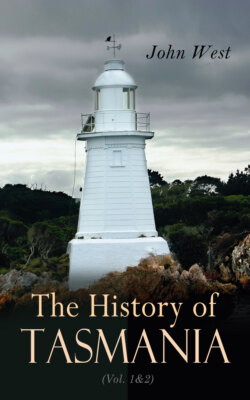Читать книгу The History of Tasmania (Vol. 1&2) - John West - Страница 41
На сайте Литреса книга снята с продажи.
SECTION XIII
ОглавлениеTable of Contents
The increasing population of the Australian colonies led to important changes in their monetary institutions. Hitherto the stock employed in banking was supplied by the merchants, or invested by East Indian capitalists. These local relations were not without their advantages: they enabled the banks to extend accommodation beyond the ordinary usage of companies subject to more extensive and complicated interests.
The announcement of the "Leviathan," as the Bank of Australasia was called, created the usual amount of discussion. The capital was desired by those who had occasion to borrow, and dreaded by such as were interested in lending. It was incorporated in 1835; and commenced operations the following year. By granting bills on London at par, the manager first drew largely on the current coin. Treasury bills were no longer the cheapest remittance, and the disposition to purchase them declined. The outcry of the local banks reached the legislative council, and it was proposed to make a treasury bill a legal tender. An act passed for the purpose, but was never called into force by proclamation. The resources of the English enabled them to vex and contract the sphere of the colonial establishments; but had treasury bills become a legal tender, they could have redeemed their own notes by their payment, and thus recovered the coin which found its way into the coffers of the stranger.
At Launceston, the quarrel between the Australasia and a local bank, afforded much sport to those not deeply interested. Of the Tamar Bank, 20 per cent. only had been paid on its capital, which was exceedingly small compared with its discounts and issues. Every morning, the agent of the London took a wheel-barrow to the Tamar bank, attended by an armed guard, and carried away the dollars in exchange for notes. The superior strength of the Australasia soon brought the contest to a crisis, and Mr. Gilles, the manager of the Tamar, shut up his books. He, however, first gave warning, that such must be his course, unless it was agreed to restore the dollar bags to the state before the war. To this it was replied that, perhaps, the Tamar had exceeded the just limits of its capital, and an offer made to discount a bill for its accommodation. In the end, time was given. The parties concerned were more frightened than hurt: no serious injury was intended.
In 1837, the Union Bank of Australia, with a capital of £1,000,000, divided the field. This institution was formed in England, under the auspices of Mr. Philip Oakden, a merchant, of Launceston. With such spirit was the project accepted, that the amount was subscribed in one day.
The chief objection to these banks was their tendency to create a class of absentees, whose revenue withdrawn from the colonies would add nothing to their welfare. To this it was replied, that the repayment was intended to be made from profits the colonies would divide with the London capitalist, which, except for his assistance, could not be obtained.
The last business address of Arthur to his council, expressed his antipathy to the London bank, and his hope that the monopoly attempted would not be successful. He asserted that the proprietary, an absentee body, had no interest but their own to regard, while the local banks were colonial in every sense. These were his views of finance, and they were characteristic of the time.
